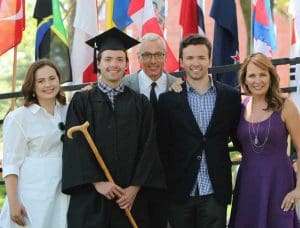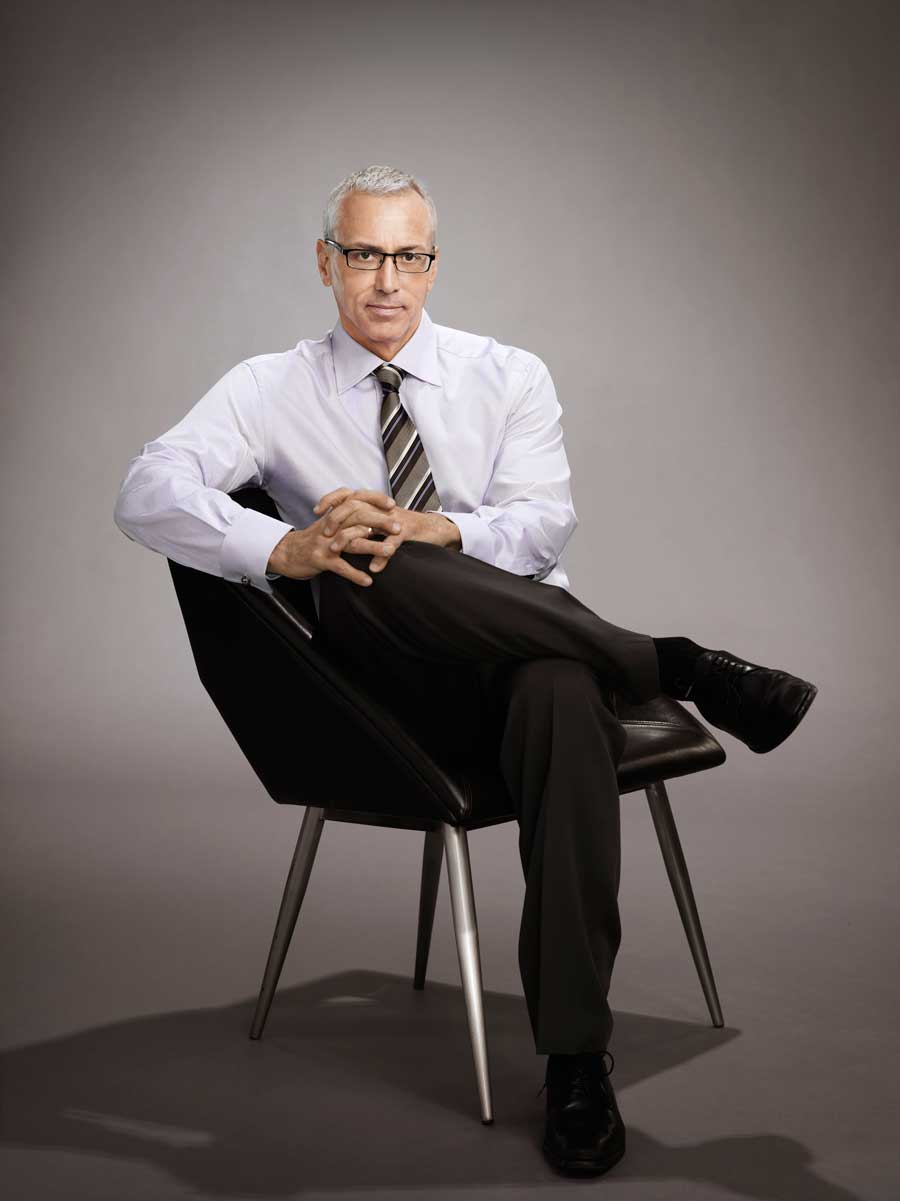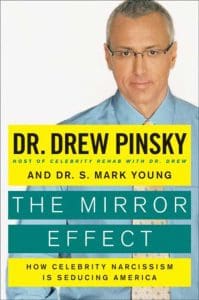A Mental Giant
Famous physician and celebrity Dr. Drew Pinsky helps mental health patients cope with their afflictions head on.
People with mental illness often suffer alone. They feel disgraced by their diagnosis and fear potential damage to their social and professional statuses.
Fortunately, those people have a courageous voice speaking for them in the form of a doctor, one who has passionately committed to educating the masses about mental illness and attempted to bury the horrific stigma associated with it.
His name is Dr. Drew Pinsky, a 57-year-old addiction medicine specialist who is better known throughout the country as Dr. Drew. He juggles two contrasting careers—medicine and mass media—to help shed light on what has become a very dark topic in America.
Television and talk radio give him effective outlets to raise awareness about mental health diseases, as well as raise the spirits of those who suffer from them. As star of the reality show Celebrity Rehab with Dr. Drew, he treated former NBA player Dennis Rodman for alcohol addiction and actor Gary Busey for cocaine addiction. Moreover, being a private practitioner allows him to treat everyday people with various mental illnesses and drug addictions successfully.
No doubt, the balancing act from private physician to national celebrity has been demanding, but it’s one Dr. Drew willingly embraces. In his eyes, mentally ill people are not “nutcases,” “psychos,” and “lunatics,” but rather people with brain abnormalities requiring effective medical treatment. No different from people who visit doctors for abnormalities of their heart, lungs, and nervous system.
“I remember early in my career, I’d kind of push the media away so I could focus on my private practice five days a week. On Friday afternoons and Saturday, we’d do five or six shows each day of my radio show Loveline. About three years ago, I found myself doing a daytime syndicated show for Warner Brothers, a show for HLN, and a radio show. It was impossible to continue practicing medicine the way I always had.”
Today, Dr. Drew continues providing outpatient psychiatry services, but most of his effort is focused on being a full-time media personality. That has proven to be a challenging transition, especially for a doctor who is so passionate about treating mentally ill patients. Yet, he’s content with opening minds and hearts to one of the most stigmatized and even ignored diseases in this country—mental health.
“We have to stop being primitive in our reaction to people with mental health [issues],” he said. “Newscasters like to say that mentally ill people are being possessed by demons. That is very wrong. They are obviously thinking about the 13th century. Demons don’t possess brains; brains become disordered for various reasons. In order to understand brain disorders, we need to become much more sophisticated and much less primitive. The brain is an organ. It has predictable pathologies that have predictable responses. They’re not bad people; they’re people with a bad illness.”
In September, Healthy Living Magazine interviewed Dr. Drew.
Q: What motivated you to enter the field of mental health?
A: I did not start out in the field of mental health. In medical school, I was training as an internist and on my way to becoming a cardiologist. During my residency, I began moonlighting at a psychiatric hospital and became intrigued with psychiatric patients. I was director of medical services and spent lots of time in the drug rehab unit. In 1990 I became director of the hospital and knew I had to get my act together in terms of understanding how to effectively treat the conflicts patients were dealing with. I spent several years training myself and learned to love the field of treating drug addicts.
Q: What are some of the more challenging aspects of dealing with people who have mental health issues?
A: Getting them access and finding them resources. On the patient side, my frustration is denial and lack of trust.
Q: For you, what is it like to help people in seemingly hopeless situations turn their lives around?
A: It gives me hope for anyone. I’ve been astonished by the least hopeful situations. I know what it’s like when a patient is able to turn his or her life around, so I hold out hope for everybody.
Q: Are mental health patients mistrustful of you and how do they treat you?
A: People spit in my face and scream at me. They typically engage in splitting behaviors where I’m either the best doctor in the world or the worst doctor in the world. They can be vicious, but my job is to hold the line and stay there with them even when they’re acting awful or unwilling to comply.
Q: What are some of the biggest misconceptions people have about mental health treatment?
A: There are two common things I run into. One, that they’ve been adulterated by television psychologists who just yell at patients. This whole notion of being confrontational with mental health patients is bizarre and not useful at all. The other misconception is that you’re going to sit in someone’s office and they’re going to tell you what to do. They’re going to give you some solution or oracle. That’s not how it works, yet people have this weird expectation of that.
Q: Several studies have indicated that mental health is on the rise in both children and adults during the past two decades. Do you feel this is true or are we over-diagnosing patients?
A: I think it’s a combination of both. We’ve expanded the diagnostic categories, so we pathologize some illnesses that were not pathological before. We are also over-diagnosing. I also thoroughly believe in the past two decades we have gone through a period of time when childhood trauma is reaching epidemic proportion. When you see the constant breakdown of families and the physical and sexual abuse of children, more mental health issues are going to accompany those things.
Q: What sort of problematic behaviors do children with mental illness engage in?
A: When it comes to trauma, they use drugs, cut themselves, and even commit suicide. Now we have a new problem—the Internet and social media. Children are getting exposed to predators and sexual images. Also, when they spend hours on the Internet, children become socially isolated, lonely, and depressed.
Q: How can people go about finding a mental health professional for themselves or their children?
A: Obviously you should start with your primary doctor or insurance carrier. However, one thing I can say is there is going to be an inclination from your primary care physician and the system to not refer you to a proper doctor. It’s very simple. If you have a heart problem you visit a cardiologist. Similarly, if you have a brain problem you need to see a psychiatrist or psychologist. You have to fight hard for a referral. And when you receive a diagnosis, don’t just depend on prescriptions from your primary care physician.
Q: How long does it take to properly assess a patient?
A: A psychiatrist can walk into a room, spend a little time with a patient, and know diagnostically what’s going on. That doesn’t mean they’re into the psychodynamics of what an individual patient’s issues are as a human, but they can diagnostically assess you rather quickly.
Q: Some psychiatrists have done away with talk therapy because insurance no longer pays for it. So instead, they prescribe medication. Does this trend bother you?
A: I’m a huge advocate of talk therapy, which takes time, especially if you’re dealing with a patient who has undergone some type of trauma. Talk therapy has many benefits, one of them being that people actually may be more comfortable talking to a stranger about their mental health problems than family or friends.
Q: There have been several states in recent years that have decriminalized marijuana. Yet, you have been on record as saying marijuana is addicting. Can you elaborate on that and tell us why you feel that way?
A: Because I’ve treated marijuana addiction thousands of times. An addiction is a relationship with a substance that you cannot stop. Period. There is no such thing as psychologically addicted. You either can stop or you cannot. I’ve treated patients who were addicted to cannabis, cocaine, and alcohol, and the one they have trouble stopping the most is cannabis. People are told that marijuana is not addicting and not that big of deal, so they think it’s okay to use frequently. They start loving the drug and find themselves in big trouble.
Q: What are the classic marijuana withdrawal symptoms?
A: The withdrawal symptoms typically last two weeks. The biggest symptoms are irritability, insomnia, desperation, and paranoia.
Q: Are you against marijuana?
A I want you to know that I’m not anti-marijuana, anti-alcohol, or anti-anything. If people want to use a substance periodically and enjoy themselves, then I think that’s perfectly fine. The problem surfaces when you frequently begin using a substance and cannot stop. Also, I want to emphasize that there are no such things as good drugs and bad drugs. That logic is terribly flawed. It’s the genetics of the biology and psychology of a given individual into a relationship with another chemical that creates a syndrome we call addiction—when they have a brain affliction they cannot stop on their own and need comprehensive management in order to do so.
Q: There’s a negative stigma attached to mental illness. What can we do as a country to have a better understanding of mental health issues?
A: This is something I chant all the time. To me, the negative stigma is bizarre. I understand that mental health patients may behave in unusual or strange ways, but it’s because they have a brain disorder. Your brain can get sick just like your pancreas or heart can get sick. The brain is a wonderful, fascinating organ, but it doesn’t function well sometimes. Why people cannot understand that the brain gets sick just like other body parts is very frustrating to me. I hope society educates itself about mental illness and provides the same kind of support and love to a mental health patient they would a cancer patient.
Three’s Company

“The first five years were insane,” he said. “Looking back, I’m not sure how my wife and I successfully raised three infants. However, by the time they were eight, they attended the same school, had the same friends, and played the same sports. Therefore, things became a little easier.”
Although his children turn 23 this month, Dr. Drew is discovering that you never stop being a parent.
“I’m actually finding that right now is one of the most challenging parts of parenting. My kids all attended excellent schools and did magnificently, and now they all want to go out into the real world. It’s hard for me to know what to tell them because it’s an entirely different world than when I graduated. When they come to me for advice, I feel anxious and clueless.”
Dr. Drew Up Close and Personal
Exercising: My garage serves as both my gym and meditation room. I’m in there four to five days a week working out, and I like to run, too.
Favorite foods: For breakfast I have one egg over easy with a cup of coffee. I don’t really have time for lunch so I munch on vegetables throughout the day. For dinner I try to have vegetables and plant-based foods.
Something few people know about you: Many people don’t know that I sang in an opera company for several years while attending college. Ironically, one of my sons is now singing opera, and he has much more talent than I ever did.
Favorite movie: “Love and Death” by Woody Allen.
Favorite sports team: I like the Los Angeles Lakers. I go all the way back to when the Lakers had an awesome rivalry with Oscar Robertson and the Milwaukee Bucks. We also attend several UCLA football games in the Rose Bowl each year.
Hobbies: Reading and listening to lectures. I attended a liberal arts college that set me on a path to learning that I cannot get off of.
Favorite book: The Rise of Theodore Roosevelt. It was one of the greatest reading experiences I ever had. The author was completely in love with the subject and brought the book to life in a manner where I just could not put it down.
What is it like being a celebrity?
“People approach me when I’m out in public all the time. I love people, and I’m willing to talk to anyone who is ready to talk. They either are very kind or they want very complicated help. That’s a little difficult because they describe situations that would take three to five years to properly treat. They want it now and don’t understand the complexity of what they’re asking.”
A distinguished career
Radio
• Loveline, a national radio show he started in 1984 as a medical student.
• Dr. Drew Live, a nationally syndicated talk radio show begun in 2007 that focused on multiple health issues.
• Dr. Drew Midday Live with Mike Catherwood launched in this year on KABC in Los Angeles.
Television
• He made an appearance on Wheel of Fortune as a medical student in 1984.
• Strictly Sex with Dr. Drew, which ran for 10 episodes on the Discovery Health Channel.
• Sex…with Mom and Dad aired in 2008 and 2009.
• Celebrity Rehab with Dr. Drew was a reality show filmed at the Pasadena Recovery Center. It aired on VH1 between 2008 and 2013.
• Sex Rehab with Dr. Drew premiered in November 2009 and was a spinoff of Celebrity Rehab with Dr. Drew. It aired for only
one season.
• Dr. Drew On Call first aired on HLN in 2011. The show focuses on health and addiction topics.
• He has also made television appearances on Dawson’s Creek, Family Guy, and Wild Hogs.
Books
• The Mirror Effect: How Narcissism is Seducing America, a New York times bestseller.
• Cracked: Putting Broken Lives Together Again
Medicine
• Board-certified by the American Board of Internal Medicine
• Board-certified by the American Board of Addiction Medicine
• Certified member of the American Society of Addiction Medicine
• Member of the American College of Physicians
• Assistant clinical professor of psychiatry at the Keck School of Medicine at the University of Southern California.
• Former medical director for the Department of Chemical Dependency Services at Las Encinas Hospital in Pasadena
• Staff member of Huntington Memorial Hospital


